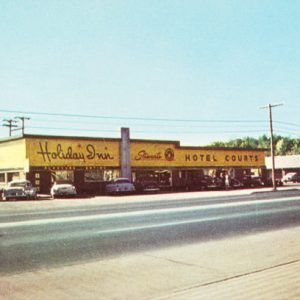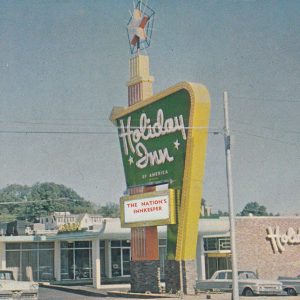calsfoundation@cals.org
Charles Kemmons Wilson (1913–2003)
Charles Kemmons Wilson was a businessman who founded the Holiday Inn hotel chain. Called the “Father of the Modern Hotel,” he revolutionized the travel industry by providing affordable, comfortable, dependable lodging.
Kemmons Wilson was born on January 5, 1913, in Osceola (Mississippi County) to Kemmons Wilson, who sold insurance, and Ruby “Doll” Wilson, a homemaker. He was their only child. His father died when Wilson was nine months old, and his mother took the baby to her hometown of Memphis, Tennessee, where she found work as a dental assistant.
Wilson’s business career began when he was six and sold subscriptions to the Saturday Evening Post. When he was fourteen, he was hit by a car while making deliveries on his bicycle. He was told by doctors that he would never walk again. It took a year to recover, but he regained the use of his legs. After his mother lost her job during the Depression, he dropped out of Memphis’s Central High School to deliver newspapers, sack groceries, and work as a soda jerk. Borrowing fifty dollars from a friend in 1930, Wilson bought a popcorn machine and sold popcorn in a Memphis movie theater. By 1933, he had made $1,300 from his popcorn business and a pinball machine venture.
Wilson used his money to build a home for himself and his mother in Memphis. He then borrowed money against his house to buy into the local Wurlitzer jukebox franchise, later owning and operating several Memphis-area movie theaters and working in real estate. After serving in World War II and starting a successful homebuilding business in the 1940s, Wilson became even more successful after taking a partner. Wallace E. Johnson of Memphis owned the largest and most successful homebuilding business in the South and was an officer of the National Home Builders Association when Wilson approached him about a partnership. Both Wilson and Johnson would later be quoted as saying their biggest piece of luck was having each other as a partner. Their thirty-five-year-long partnership in homebuilding and real estate development proved rewarding for both entrepreneurs. By 1950, Wilson was a millionaire.
Wilson married Dorothy Lee and had five children by 1951. In August of that year, at his wife’s insistence, he took the family in their Oldsmobile (without air conditioning) on a vacation to Washington DC. Along their drive, they found accommodations which forced them to choose between expensive downtown hotels and “mom-and-pop” operations such as boarding houses and tourist courts. The accommodations were of varying quality and generally charged for each of his five children. At one lodging, the room was six dollars, and the Wilsons were also charged two dollars for each child. He decided that with more middle-class Americans traveling in the post-war prosperity of the 1950s, families needed clean, comfortable places with air conditioning, the newly popular television, nearby food, and a swimming pool for the children to play in and adults to relax around.
Wilson saw the benefits of having a dependable chain with “no surprises” and no additional charge for children. He is quoted as saying, “In those days, you wouldn’t dream of renting a room without inspecting it first. I wanted to create a brand that people could trust.” His criteria set the standard for the hotel industry.
On August 1, 1952, he opened the first of four hotels in the Memphis area. He decided on the name Holiday Inn after the popular 1942 Bing Crosby film, which his draftsman had watched the night before submitting his plans. The very first Holiday Inn was on Memphis’s Summer Avenue.
Using his movie theater experience, Wilson designed the green-and-gold Holiday Inn marquee along with the Cummings Company of Nashville to be bright, cheerful, and easily visible from the highway. A blinking arrow pointed to the office, while an illuminated sign promoted local gatherings such as civic clubs and proms. It was officially patented as the Great Sign, and when it was replaced with something more “modern” in 1982, Wilson (who retired from the board in 1979) called it “the worst mistake they ever made.”
Wilson’s mother, who was a company vice president and who had worked with him on the décor for his housing business, decorated the Holiday Inn rooms in bright, friendly, warm colors. There was a Bible in each room. Every property had air conditioning, a swimming pool, a restaurant on the premises, in-room phones, free ice, dog kennels, free parking, and available babysitters. The franchisees who operated Holiday Inns were not called managers but innkeepers. In the early days, innkeepers would phone ahead to make guests’ reservations at the next Holiday Inn on their route. As the number of hotels increased, a computerized reservation system was set up, which Wilson called “the most revolutionary step since the opening of the first inn.”
In the United States, Wilson placed his properties so they could be easily spotted by travelers along the new interstate highway system of the Eisenhower era. The standardized properties were identical and within one day’s drive of each other. The business went international in 1960, and by 1964, there were more than 500 Holiday Inns worldwide. An early investor in the business was Memphis music producer Sam Phillips of the legendary Sun Studios. In 1968, Wilson stated that 100 shares of Holiday Inn, which originally cost $975, would be worth over $40,000.
Continuing to partner with real estate developer Wallace Johnson, Wilson grew the world’s largest hotel/motel business. In a 1972 cover story about Wilson, when a new Holiday Inn was opening every three days, Time magazine wrote, “Kemmons Wilson has transformed the motel from the old wayside fleabag into the most popular home away from home.” Slate magazine said he placed his motels firmly where the Baby Boom met the open road. USA Today called Holiday Inns “the Walmart of the roadside.”
The first Holiday Inn, which had been built in 1952, was sold in 1973 and torn down in the 1990s to make room for a funeral home. In 1979, Wilson retired after a heart attack and bypass surgery. Retirement was short-lived, for he then built Orange Lake Resort and Country Club in Orlando, Florida. In the 1990s, he developed Wilson World Hotel & Suites, as well as Wilson Inns & Suites.
Among his accolades are the Horatio Alger Award (1970) and induction into the National Business Hall of Fame (1982). He left a living legacy with the creation of the Kemmons Wilson School of Hospitality and Resort Management at the University of Memphis, with the first students admitted in August 2002. Students can learn the industry in an on-site, full-service hotel.
Wilson died on February 12, 2003, at his Memphis home. He is buried in Forest Hill Cemetery-Midtown (on Elvis Presley Boulevard) in Memphis.
For additional information:
Bly, Laura. “Come Inn Off the Highway.” USA Today, May 24, 2002.
Kemmons Wilson School of Hospitality and Resort Management. http://www.memphis.edu/wilson/ (accessed August 2, 2023).
Wilson, Kemmons, with Robert Kerr. Half Luck and Half Brains: The Kemmons Wilson, Holiday Inn Story. Nashville, TN: Hambleton Hill Publishing, 1996.
Nancy Hendricks
Arkansas State University
 Business, Commerce, and Industry
Business, Commerce, and Industry World War II through the Faubus Era, 1941 through 1967
World War II through the Faubus Era, 1941 through 1967 Holiday Inn
Holiday Inn  Holiday Inn of America
Holiday Inn of America 



Comments
No comments on this entry yet.